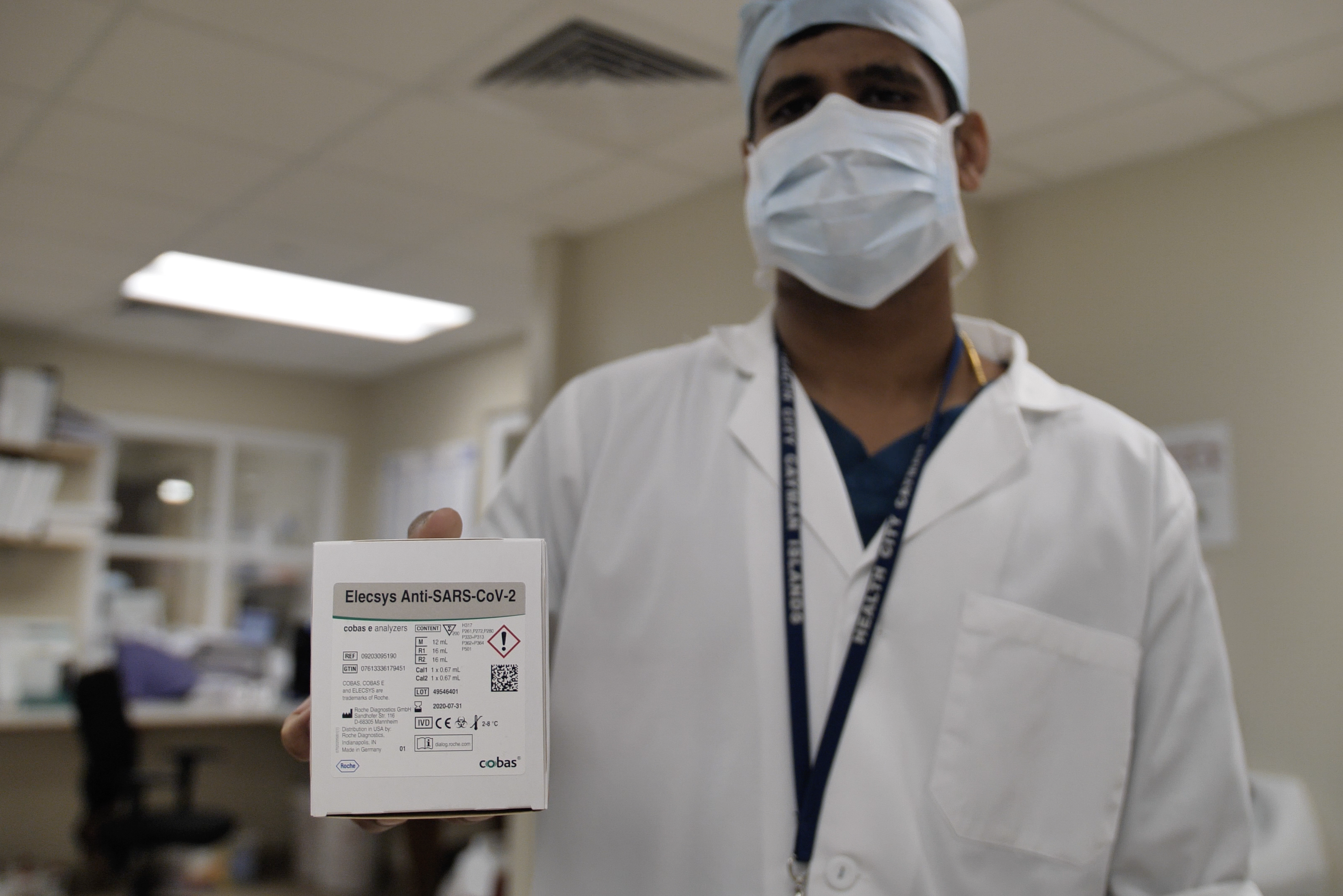|
Date |
ArticleType |
|
6/29/2020 |
Community |
Health City begins COVID-19 antibody testing |
|
|

Health City Cayman Islands is offering COVID-19 antibody testing using the Roche system approved by Public Health England
Antibody testing for COVID-19 began on Saturday, June 20 at Health City Cayman Islands following the arrival of 5,000 test kits from Roche Diagnostics – one of two antibody test systems approved for use by Public Health England in May 2020.
Clinical Director Dr. Binoy Chattuparambil was pleased to add antibody testing to the Cayman Islands’ arsenal in fighting the spread of COVID-19.
“With the introduction of antibody testing, in addition to the PCR testing and all modalities of treatment, the Cayman Islands has the complete package in detecting and fighting COVID-19,” he said. “We are already at number three in the world for PCR testing per population. Our results show we are one of the safest places on Earth right now, so it is a very proud moment for me, and the public should take great comfort, because we can say we are living in a country that is very safe in terms of COVID-19.”
Antibody testing, also known as immunoglobulin testing, detects antibodies in the blood which are developed as part of the body’s immune system defense against viruses and diseases.
Immunoglobulin testing differs from PCR testing as while the PCR test via nasal swab detects active COVID-19 infection, the antibody test measures COVID-19 antibodies in the blood which indicate that the body has already fought the virus.
There are two types of immunoglobulin that could be present in the bloodstream following exposure to COVID-19.
Immunoglobulin M (IgM) is the first antibody to appear in the response to initial exposure to a virus or bacteria and which would indicate recent or current infection. This antibody disappears after a few weeks. Immunoglobulin G (IgG) protects you against infection by "remembering" which germs you've been exposed to before. IgG appears in the bloodstream 14 days following infection and is thought to build long term immunity to the same strain of virus.
The antibody test itself is quick and -simple, requiring only 3cc of blood to be drawn with results back in under an hour.
Antibody testing can support priority screening of high-risk groups for COVID-19 infection, such as healthcare workers, delivery service providers, or food supply workers who may have already developed a certain level of immunity and could continue serving and/or return to work.
As healthcare specialists worldwide continue to research the virus and understand more about immunity to COVID-19, the tests could also help communities to reopen and return to normality faster.
“When you get a virus, your body will form antibodies to fight it. So usually if there is subsequent infection or entry of the virus into the body, these preformed antibodies will fight the virus and you should not will not get an overt infection. By knowing you have this antibody, you know you are most likely safe because you are immune to a subsequent infection by the same strain of the virus,” Dr Chattuparambil said.
Another key aspect of widespread antibody testing for COVID-19 in any population is to determine the prevalence of the disease in the community for epidemiological study. With the COVID-19 virus being a relatively new disease, research continues into all aspects of its spread, symptomology, and treatment.
Since infection with the virus often goes without symptoms, as has been seen locally with the vast majority of cases being asymptomatic, many people may not know they have already been infected with COVID-19.
Antibody testing can provide more clarity to determine the level of COVID-19 which existed in the local community and also the potential “immunity” of the population to infection or reinfection.
Public Health has been directing all COVID-19 testing in the Cayman Islands, and the antibody testing at Health City will feed into the national tracking of the rate of infection in the local population.
“All the data from these antibody tests will be shared with Public Health because it is a notifiable disease. We have to share this information with Public Health by law – whether it is positive or negative. This testing is very important as it will help further epidemiological studies in a big way,” Dr. Chattuparambil said.
Since antibody testing does not determine whether an individual has an active or past infection, as it cannot differentiate between IgM and IgG antibodies, everyone who tests positive for antibodies to COVID-19 must also take a PCR test.
“Our antibody testing cannot differentiate between IgM or IgG, but it will tell you that you have this antibody. If someone tests positive for this antibody, we recommend as a next step the PCR test to determine when they had the virus. If the PCR test is negative it means the infection was past and they have IgG immunity,” Dr. Chattuparambil said.
The first priority for Health City with antibody testing has been its own front line workers, who had already been given PCR tests, followed by front line workers from other organizations.
Health City has also partnered with local private practitioners and clinics to have blood samples collected at their offices, and sent to the hospital lab for processing.
Additionally, the tertiary care hospital is offering antibody testing to the general public, and is taking bookings for testing appointments.
Test results are sent to the patient or referring physician by email within 24 hours. All patients who test positive will be contacted by Public Health for follow-up PCR testing to determine if their infection is past or present.
To book an appointment for antibody testing, interested parties can send an email to [email protected] including their name, date of birth and phone number. Alternatively, they can also call or text 525-1481.
Testing appointments will be booked between 10am and 12pm and from 1pm to 3pm Monday to Friday and on Saturdays from 10am to 12pm.
|
|
|